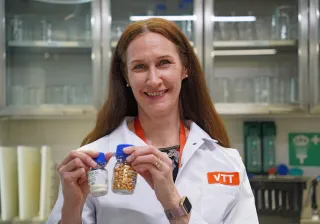Which things cause the most despair these days? In these times, as we all endure the COVID-19 pandemic and its consequences, diseases are no doubt one thing that comes to mind. Many would also say that climate change and the loss of biodiversity are the cause of the deepest and most far-reaching despair. New genomic techniques offer opportunities to tackle these thorny issues. These opportunities, however, are not being utilised in Europe.
New genomic techniques make precise changes, “edits” to the genes of living cells that enable the breeding of plant and animals in the desired direction faster and much more accurately than traditional mutagenesis techniques, such as irradiation and chemical treatment. By utilising these techniques, crops can, for example, be bred more accurately and more rapidly to be drought and disease resistant and/or to produce higher yields. We can also develop animal or cell models to investigate the root causes of illnesses or the efficacy of medicines, or to modify the somatic cells of a sick person using gene therapies so that the disease can be healed without interfering with the person’s hereditary characteristics.
The potential of new genomic techniques, or “gene editing” is truly exponential, and there are unlimited possible applications. For example, the techniques can be used to render a particular gene inactive and thus remove the unwanted trait. These technologies are relatively easy to apply and they can decisively speed up research and development. Could new gene editing be one of the technologies for bringing exponential hope?
European legislation and people's attitudes pose obstacles to applying these techniques
In European legislation, new genomic techniques are currently interpreted as coming under the laws on genetically modified organisms. Within the scope of this legislation, the application of the new techniques requires extensive and expensive risk assessments, which in the area of plant breeding, for example, are only within the means of the largest companies.
This has led to a complete halt in the introduction of new genomic techniques in Europe, where gene editing is currently only applied in basic research projects, which don’t require the extensive risk assessments of product releases. The only other place where a similar interpretation of the law applies is New Zealand. Everywhere else, the new genomic techniques are considered equivalent to mutation breeding. A particular difficulty arises from the impossibility of verifying if these new techniques have been used to produce particular products, indeed because they are identical in most cases to natural mutations, so such products may be already entering the European market.
Another factor that curbs the use of new genomic techniques is consumer attitudes; food industries dealing directly with consumers see that the market is against both gene technology and new genomic techniques, often confusing the two. Such industries do not therefore want to implement the new technologies because they suspect that the products developed would not be successful on the European market.
How to change this situation
If there would be a desire in Finland and Europe to foster a more favourable climate towards new genomic techniques, the most essential step would be to provide people with objective and up-to-date information on them. It would be good to start increasing understanding by covering the basics of gene editing during secondary level education. On that basis, everyone could decide for themselves whether to oppose the technology or support the end product that is being attained.
Another option would be to amend either the legislation itself or how it is interpreted. In the project “Utilising New Genome Editing Techniques in Finland”, as part of the Government’s analysis, assessment, and research activities, we described three different scenarios regarding ways of interpreting legislation related to plant breeding: 1) Playing it Safe, 2) Growth from Sustainability, and 3) Knowledge-based Decision-making.
- In the ‘Playing it Safe’ scenario, new genomic techniques are equated with genetic modification, as is currently the case in Europe. In this interpretation, risk management is emphasised.
- In the ‘Growth from Sustainability’ scenario, both the new genomic techniques and genetic modification can be applied relatively freely, as regulation focuses on the end product. End-product-based regulation is widely supported within research circles.
- The ‘Knowledge-based Decision-making’ scenario is a hybrid approach in which genomic techniques are distinguished from genetic modification. Its regulation focuses on impact assessment – the weighing of both benefits and risks.
The latter two scenarios aim at maximising the benefits gained from new genomic techniques.
Climate change is advancing – Can we afford not to use new technologies?
Due to both public attitude and the interpretation of legislation, Europe is inevitably lagging behind the rest of the world with regards to the opportunities offered by new genomic techniques. This is particularly the case in the plant breeding market. We are therefore losing out – due to negative attitudes – on utilising a technology that could bring solutions to global challenges. There is an urgent need to cultivate plants to withstand the new growing conditions brought about by climate change and thereby ensure future food production. New genomic techniques, which accelerate plant breeding, would be very useful for meeting this challenge. Can we really afford not to use them?
The Prime Minister of the United Kingdom has stated that the UK is promoting new genomic techniques to develop its agricultural products. Is this the wake-up call that Europe should finally take heed of? Or is it instead wise to continue to stand against the tide of worldwide developments?
One of the researchers interviewed in our scenario project stated: ‘Europe will become a museum of research and development unless new genomic techniques can be applied here. Innovations and new products will simply enter the market elsewhere!’
The inspiration for this blog post came from the project “Utilisation of New Genome Editing Techniques in Finland”, carried out as part of the Government’s analysis, assessment and research activities. The project report was published on 21 May 2021. The report was written by: Nina Wessberg, Anneli Ritala, Suvi Häkkinen and Santtu Lehtinen from VTT Technical Research Centre of Finland, Johanna Vilkki and Alan Schulman from Natural Resources Institute Finland (Luke), and Jussi Laine and Satu Korhonen from Demos Helsinki.








